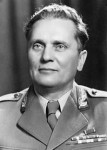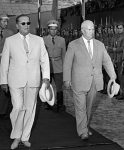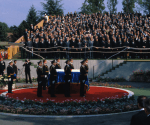 Josip Tito (1892-1980) was a Croatian soldier, socialist revolutionary and the authoritarian ruler of Yugoslavia for much of the Cold War. Born near the Croatian-Slovenian border, Josip Broz was one of 15 children of a peasant farmer. Broz was trained as a locksmith and left home to find work in Zagreb. During World War I he was conscripted into the Austro-Hungarian army and was sent to fight on the Russian front. Broz excelled as a soldier, rising to the rank of sergeant-major despite being in his early 20s. In 1915 he was captured by the Russians in Galicia and held in a prisoner of war camp. He was released in 1917 and travelled to Petrograd, where he witnessed the October Revolution. Broz became an admirer of Vladimir Lenin and worked in communist-held regions during the Russian Civil War (1918-20). He returned to his homeland, now re-formed as Yugoslavia, in 1920.
Josip Tito (1892-1980) was a Croatian soldier, socialist revolutionary and the authoritarian ruler of Yugoslavia for much of the Cold War. Born near the Croatian-Slovenian border, Josip Broz was one of 15 children of a peasant farmer. Broz was trained as a locksmith and left home to find work in Zagreb. During World War I he was conscripted into the Austro-Hungarian army and was sent to fight on the Russian front. Broz excelled as a soldier, rising to the rank of sergeant-major despite being in his early 20s. In 1915 he was captured by the Russians in Galicia and held in a prisoner of war camp. He was released in 1917 and travelled to Petrograd, where he witnessed the October Revolution. Broz became an admirer of Vladimir Lenin and worked in communist-held regions during the Russian Civil War (1918-20). He returned to his homeland, now re-formed as Yugoslavia, in 1920.
After returning home Broz worked as a waiter. He also became involved in the union movement and joined the small but illegal Yugoslav Communist Party. In 1928 he was arrested for his political activities and sentenced to five years in prison. After his release, Broz lived underground and began using the codename Tito. In 1934 he was elevated to the Central Committee of the Communist Party, then three years later became the party leader. When the Nazis invaded Yugoslavia in 1941, Tito was named as commander in chief of the resistance. His wartime leadership was so effective that Tito seemed the logical candidate to lead post-war Yugoslavia. He became prime minister in November 1944, while still leading the resistance. Tito’s political leadership was confirmed by elections in November 1945. He oversaw the creation of the Federal People’s Republic of Yugoslavia and the adoption of a new republican constitution in January 1946.

At first, the world considered Tito another servant of Moscow, loyal and obedient to Joseph Stalin. The Yugoslavs had liberated themselves without much help from the Soviets, however, and Tito was nobody’s puppet. Divisions soon emerged between Belgrade and Moscow, particularly over economic development. Tito defied Stalin by developing his own form of socialism, based on syndicalist models where workers had a greater say in production. Soviet attempts to bring Tito to heel failed, and in 1949 Yugoslavia withdrew from the Cominform, sparking Soviet troop mobilisations on the border and fears of an invasion. Stalin allegedly ordered several assassination attempts on the Yugoslav leader, to which Tito famously responded: “Stop sending people to kill me. We’ve already captured five of them… If you don’t stop sending killers, I’ll send one to Moscow – and I won’t have to send a second”. The Soviet-Yugoslav split allowed Tito to seek financial aid from the United States. Backed by US president Harry Truman, this aid was granted in 1951.

Stalin’s death in 1953 eased tensions between Moscow and Belgrade. Tito remained independent, unpredictable and never prepared to commit to a firm alliance. He developed his own foreign policy stance called “positive neutralism”, opening up dialogue both with Soviet bloc and Western nations. Domestically Tito remained anti-democratic and authoritarian, arresting political opponents, suspected Soviet sympathisers and even writers who criticised him. His government had its own secret police agency and created labour camps like Goli Otok to house political prisoners. In 1963 the country became the Socialist Federal Republic of Yugoslavia. Despite its commitment to socialism Tito’s government allowed some religious freedoms and ownership of private capital. Tito himself toured the world to meet and build relationships with socialist and democratic leaders. In 1961 he hosted the formation of the Non-Aligned Movement (NAM), a group of Cold War leaders who considered themselves independent of the Soviet and Western blocs.
In the early 1970s Tito initiated or allowed a series of political reforms, aimed at liberalising Yugoslavian government and allowing greater autonomy for its different regions. A new federal constitution was passed in 1974. Both Tito’s health and his grip on power began to weaken. In 1978 the Yugoslavian leader, then 85 years old, undertook a prolonged tour of the Soviet Union, China and North Korea. Tito died in May 1980. The loss of this unifying figurehead, coupled with the reforms of the 1970s, contributed to the break up of Yugoslavia and the Balkan Wars of the 1990s.
Content on this page is © Alpha History 2018-23. This content may not be republished or distributed without permission. For more information please refer to our Terms of Use.
This page was written by Jennifer Llewellyn and Steve Thompson. To reference this page, use the following citation:
J. Llewellyn & S. Thompson, “Josip Tito”, Alpha History, accessed [today’s date], https://alphahistory.com/coldwar/josip-tito/.
